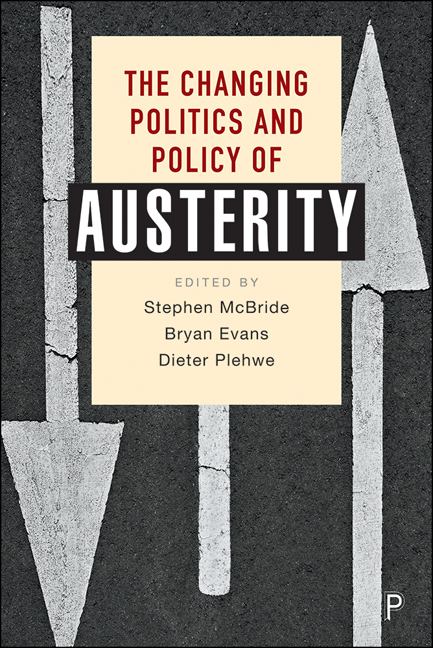Book contents
- Frontmatter
- Contents
- List of figures and tables
- Notes on contributors
- Acknowledgements
- Introduction
- PART I Austerity and the promotion of the private
- PART II Coping and casualties: labour and the social
- PART III Beyond coping: protest, pathologies and the development of real alternatives
- Conclusion
- Index
7 - There could be alternatives! German economic advisory councils and the institutional reproduction of austerity economics
Published online by Cambridge University Press: 13 May 2022
- Frontmatter
- Contents
- List of figures and tables
- Notes on contributors
- Acknowledgements
- Introduction
- PART I Austerity and the promotion of the private
- PART II Coping and casualties: labour and the social
- PART III Beyond coping: protest, pathologies and the development of real alternatives
- Conclusion
- Index
Summary
Austerity-related expertise and mainstream economics in particular have been widely blamed for locking in austerity regimes and reproducing austerity policies in European countries and in the EU. Austerity is here understood in the broader sense of social reforms to reduce private sector charges beyond the narrower ‘technocratic’ concern with balanced budgets and ‘sound’ public finance or the reduction of public debt. Austerity politics are designed to reverse the historic development of the expansion of the public sector in general and in the area of social policy and welfare provision in particular. Reducing welfare state benefits would qualify much like cutting public services, for example, because the aim is to overall reduce the level of taxes and social security contributions in spite of clear evidence of fundamental flaws, pathologies and counterproductive impacts of such welfare state retrenchment and resulting redistribution from the bottom to the top (Blyth 2013).
Although a range of economists in the field of social (in)equality, (modern) monetary theory and Post-Keynesianism like Thomas Piketty (2015), Stephanie Kelton (2020) or Steve Keen (2001) have long worked to debunk claims made by neoliberal and neoclassical economists of various schools (supply side economics, public choice, monetarism, ordoliberalism and so on), heterodox positions have been marginal in many countries. German economics has been found to constitute a particularly problematic case due to a strong conservative-neoclassical and neoliberal bias in the German profession (Heise and Thieme 2015; Grimm et al 2018). Botzem and Hesselmann (2018) document the close proximity of neoliberal think tanks and the German Council of Economic Experts (compare also Pühringer 2020). Fricke (2016) observed a reversal of this long-term development following the GFC. But it remains to be seen if this will lead to a change in the institutional sphere of policy consulting. In one way or another, the argument about the German economic field emphasizes asymmetry and bias in favour of austerity.
Opposing claims can be found in the literature on German economic expertise under the labels of corporatism and pluralism. Campbell and Pedersen (2014) introduce the German system of expertise as a classical model of inclusion. Different groups in society in general and capital and labour in particular are considered well represented in policy-related knowledge production.
- Type
- Chapter
- Information
- The Changing Politics and Policy of Austerity , pp. 147 - 175Publisher: Bristol University PressPrint publication year: 2021

